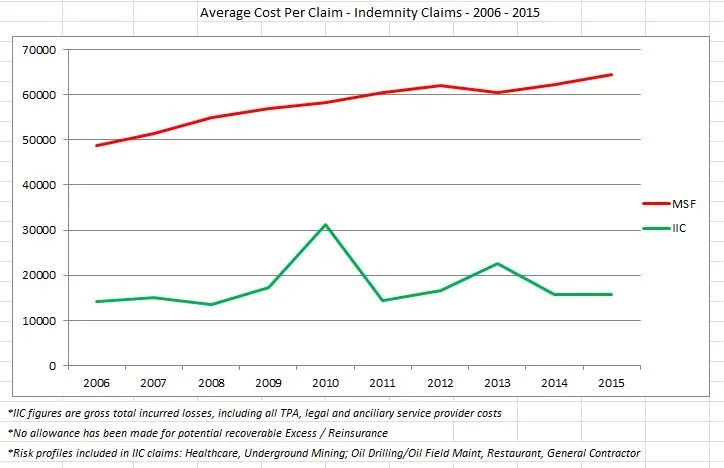
Workers' Compensation Claims - Why Do We Do This?
March 1, 2022 – Michael Marsh
A persistent question of workers' compensation claims professionals is "why do you do what you do?" The question is typically among several that follow the question "what do you do for a living?" If you are in the industry or have served as a claims professional, you are no doubt showing a little smirk about now. We've all had the questions. We've all come up with answers.
As was said by Dr. Claire Muselman, very few in the claims sector graduated from high school and sought out to major in workers' compensation at their chosen college. Most folks that get into the claims area typically get there by accident...not as part of their 'grand career scheme.' This first step on the career path in some cases makes the WHY question difficult to answer. Many have answered the question when I asked them..."I don't remember how I got started, I mean, it was like 'why not?'"
WHY goes to the internal motivation and ethical considerations that one brings to a job. Different than a cell phone sales job, heavy equipment operator job or grocery store clerk, the WC claims profession puts one in a position to 'take it from all sides.' The claims professional is like the hub of a spoked wheel, each spoke representing a connection to a claim process stakeholder.
These stakeholders vary greatly. Some participants are directly involved, such as the recovering worker and their family, while others are important but only peripherally involved. Whether directly involved or peripherally, these stakeholders all carry an importance to the process which must be acknowledged and respected. The WC claims professional is educated, trained and prepared for interaction with this wide variety of people...in a perfect world.
In reality, claims professionals are not typically given much, if any, soft skills training or education in the differing roles played in the process by retail agents/producers, regional and national brokers, and the myriad other folks that have legitimate interest in the claims process. They are brought up through the chairs from admin duties to MO adjuster to Lost Time adjuster to Litigation Specialist. Some move into positions of additional influence as Supervisor, Manager and above. At each step of the way there are additional responsibilities added, with new and more challenging claim-related issues introduced.
In our regular continuing education classes, we spend a good amount of time on digging deeper into the WHY.
In our single state practice, known for its liberal compensability rules and Supreme Court, delving into the WHY provides additional tools to our claims professionals and other staff. WHY starts at the top.
Claims professionals are expected to follow guidelines and client instruction manuals. That much seems clear across all portions of the claims industry. What is apparent, at least to us for claims taken over from other national Third Party Administrators (TPAs), is that beyond pushing many buttons in the electronic claims system, there are few actionable items that universally appear. The results indicate a limited pallet for responses to WHY.
Our claims practice answers to WHY include, but are not limited to:
1) Our primary job is to be a guide to those that are injured and in the system. We need to guide them safely and effectively through the system and return them to their non-workers' compensation life. We do this through being their advocate, leader and partner, with empathy for their position at the same time as being the single representative that many recovering workers will ever come into contact with inside "the system."
2) We are in a position to favorably impact another human being's life and that of their family and friends. It is our RESPONSIBILITY to make every interaction as positive as possible...even if in limited circumstances we need to deliver a "no" response to a request.
3) Treat others as you would wish to be treated.
4) Be innovative. Go above and beyond in the process to find a way to achieve success on moving the recovering worker through and out of the system.
5) Appreciate our unique place in society. We are blessed with the opportunity to help others in their times of need. Accept this blessing with thanks and carry it through to daily actions. Faith in your ability, faith in the process, faith in the inherent goodness of others. Faith is evidenced by action. As said recently by Mr. Rod Lake, paraphrasing, you don't deserve what you don't appreciate. Listen to a podcast interview with Rod Lake by clicking here, it was a moving experience for us. Show your appreciation and respect for our place in society through your words and actions. Every day. Every call. Every e-mail. Every face-to-face meeting with the recovering worker and their family. BTW, we routinely meet with our recovering workers. We don't just assign a nurse to attend appointments on serious claims. We invite them to the office to sit down and share their thoughts, concerns and questions.
6) Our daily reminder to one another is to "Humanize the Workers' Compensation Claims Process." If we put first on our actionable priorities to treat other human beings with respect, allow them their dignity and lead with empathy, we will in many (or most in our experience) situations achieve items 1 - 5 above.
So what does all this soft skills talk, philosophy and non-objective standard mumbo jumbo (as one client national brokerage auditor said about our claims process) lead us to? Remarkably BETTER RESULTS than the state average costs. The graph below shows the average lost time claim costs achieved by our office compared to the state average. On over 34,500 claims, the numbers are large enough to have significant credibility. Not only can we brag about a 1.5% litigation ratio (claims involving an attorney against the total number of reported claims), the earlier Return To Work (RTW) timing has saved our clients untold amounts in employee replacement, temporary costs and new training costs. From a pure loss cost standpoint, our team approach living every day the philosophy of a different way to handle claims led to tens of millions of dollars in savings to our client companies.

Takeaway: Handling workers' compensation claims, setting the highest priority of knowing WHY we do what we do, and clearly understanding how to implement each step of the WHY, leads to measurable, positive results for the employer and the recovering worker.
